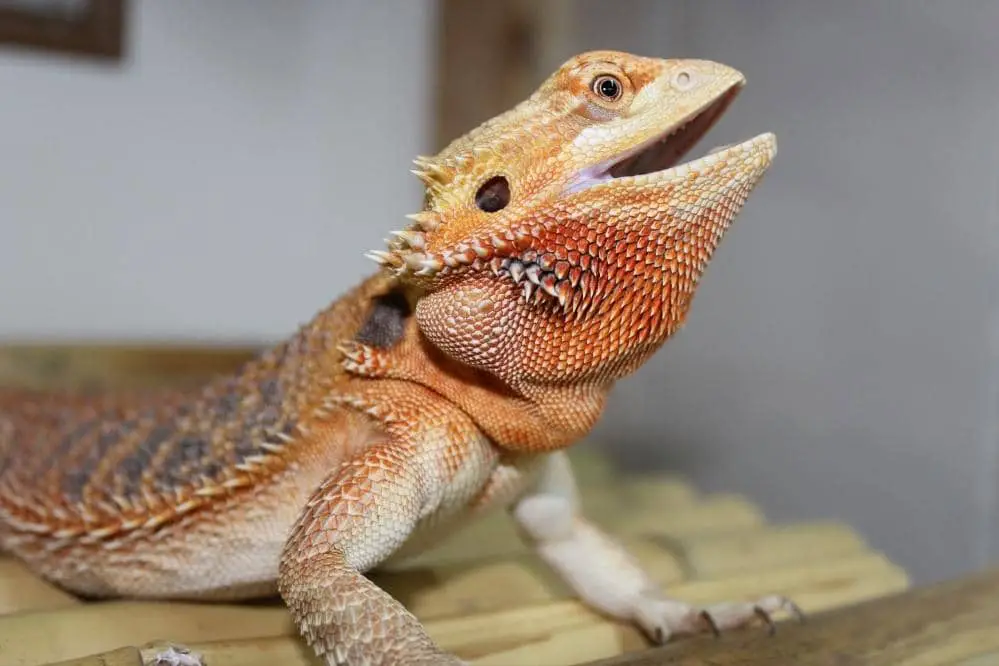Dogs, cats, and birds (the most popular pets globally) produce different voices to communicate with other animals and their owners. They often test your and your neighbor’s patience by making too much noise. Therefore, reptiles (especially bearded dragons) are a good option if you don’t like too much noise because making voices is not their primary way of communication. Bearded dragons usually communicate using their body language and behavioral change. As a beardie’s owner, you may have heard your bearded dragon making weird noises and ask questions like “Why Does My Bearded Dragon Make Weird Noises” or “Do bearded dragons really vocalize.”
Do Bearded Dragons Really Vocalize?
NO / YES
Technically speaking, unlike mammals, the bearded dragon can’t vocalize or make noises because they don’t have vocal cords in their throat. So they use physical language (like body posture, change in body color, etc.) to communicate with others (animals or humans). In fact, they have a very precise and clear body language that everyone can apprehend quickly. The absence of a vocal cord does not hinder their daily life because they have fantastic eyesight and amazing hearing ability, which means they can detect and send messages to anyone from a distance.
Just because bearded dragons are missing vocal cords doesn’t mean you will never hear anything from them. Obviously, you are here because you have noticed your bearded dragon is making weird noises, and you want to know the reason. Yes, in rare cases, bearded dragon dragons make some sounds. Are these sounds normal, or what do they actually mean?
Noises Bearded Dragon Make & What They Mean
Hissing
It’s very likely that the first sound you will hear from your bearded dragon will be “Hissing”. Generally, beardies make this sound when they are afraid of something, anxious, or some other lizard is intruding on their space. We can also translate this sound as “aggression” because when bearded dragons are afraid, instinctively, they try to look aggressive (this helps them feel safe). When another lizard enters their territory, they make this sound as a sign of aggression and dominance. When producing this sound, you often see other physical signs of aggression like open jaws, arm waving, and tail flicking.
If you have recently adopted a beardie and he is not accustomed to you, you may hear him hissing when you approach him or enter your hand into his cage for petting or taking them out. It means he is considering you as a threat or intruder. However, if your bearded friend is puffing up and turning black along with hissing, it’s a red signal, which means you should stop because he is very likely to bite you as a defensive move. In this scenario, leave him alone for a while, and try to approach him after some time.
We can conclude that it is more defensive than aggressive behavior as they hiss and attack as the last option to defend their territory.
Huffing
Another sound that bearded dragons frequently make is “Huffing.” This sound resembles coughing, however slightly longer and more pronounced. It feels as if the beardie has expelled a lot of air at once after holding his breath for a while. Bearded dragons make this sound to express their displeasure or anger when something disturbs them. They also make this sound to warn any nearby dreaded dragon or animal or even their owners (when they are newly adopted and have not become familiar with their owners). Huffing can also be an attempt to frighten and get rid of kids or other pets because he is concerned due to their continuous presence around his cage.
If your bearded dragon is huffing and hissing too often, it means he is being irritated by something continuously. Soon, he will become aggressive and more like to attack you or any other animal in close vicinity.
Burping
Burping is another sound that bearded dragon owners frequently hear. Bearded dragons usually burp for the same reason humans burp. That means they burp when they have eaten enough, and their tummy is full. So we can say that “burping” is not vocalization in an absolute sense. It is actually the sound produced during the natural reflex of beardie’s gut.
However, if your bearded friend is burping too much during meal time or other than meal time, it indicates that excessive gas has accumulated in his stomach that the body is trying to expel. Excessive gas in the stomach also shows that the lungs are not getting sufficient air, which can lead to complex respiratory issues if this situation is prolonged.
So if burping continues for too long or is accompanied by discomfort or difficulty breathing, seek for vet’s help immediately.
Chirping
Chirping is a sound that you will rarely hear from your bearded dragon. Beardies make this sound less frequently as compared to hissing or burping. You might hear it occasionally, most likely when the beardie is yawning. It generally indicates that your beardie is comfortable in the current environment and looking to have a nap. However, you are less likely to hear this sound because bearded dragons in captivity rarely make this sound.
Clicking
Clicking is a sound that bearded dragons don’t make voluntarily. It is an involuntary sound produced when something is wrong with the jaw’s movement and upper and lower teeth grinding with one another. A clicking sound is also made if your bearded friend suffers from an upper respiratory tract infection. However, in this case, other signs like coughing, sneezing, and labored breathing are also present, along with the clicking sound. Whatever the reason, immediate veterinary care is compulsory in both cases to avoid complications.
Croaking
Croaking is another sound that represents infection of the airways; however lower respiratory tract (e.g., lungs) is involved this time. Beardies also make this sound when their throat is swollen due to allergy or infection. Whatever the case, the sound is actually produced when the lungs have to push harder than usual to expel the air out. You can easily differentiate it from clicking or upper respiratory infection because, in this case, there is more difficult respiration, and other signs like dilated nostrils, scratching nose, open mouth breathing, etc., are also more apparent.
Gagging / Choking Sound
As indicated by the name “Gagging / Choking,” the sound is produced when your bearded dragon is choked. This kind of sound means something is stuck in your beardie’s throat, which is really a painful and annoying situation. So it’s imperative to respond quickly and find a vet for your beardie’s checkup. As a responsible reptile owner, you must also learn how you can keep your bearded dragon from gagging or choking and what is the correct particle size to feed your beardie? Because in most cases, bearded dragons are choked by feed or other edible items.
Purring sound
Bearded dragons can’t make a purring sound (like cats) for two reasons. First, they don’t have vocal cords (as already mentioned), and 2nd, purring to show love and affection for the owner (as cats do) is not part of their instinct. So if you hear your beardie making a purring sound, it could be due to an allergy or infection in their nose or throat.
Some Other Respiratory Sound
Wheezing: When upper or lower respiratory infection is not treated promptly, and it worsens.
Rasping: When your beardie’s airways are obstructed due to any reason.
Whistling: When your bearded friend’s nostrils are blocked for any reason.

